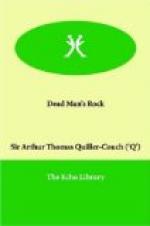CHAPTER II.
TELLS HOW MY FATHER WENT TO SEEK THE TREASURE; AND HOW MY MOTHER HEARD A CRY IN THE NIGHT.
So my father sailed away, carrying with him—sewn for safety in his jersey’s side—the Will and the small clasped Bible; nor can I think of stranger equipment for the hunting of earthly treasure. And the great iron key hung untouched from the beam, while the spiders outvied one another in wreathing it with their webs, knowing it to be the only spot in Lantrig where they were safe from my mother’s broom. It is with these spiders that my recollections begin, for of my father, before he sailed away, remembrance is dim and scanty, being confined to the picture of a tall fair man, with huge shoulders and wonderful grey eyes, that changed in a moment from the stern look he must have inherited from Amos to an extraordinary depth of love and sympathy. Also I have some faint memories of a pig, named Eleazar (for no well-explained reason), which fell over the cliff one night and awoke the household with its cries. But this I mention only because it happened, as I learn, before my father’s going, and not for any connection with my story. We must have lived a very quiet life at Lantrig, even as lives go on our Western coast. I remember my mother now as she went softly about the house contriving and scheming to make the two ends of our small possessions meet. She was a woman who always walked softly, and, indeed, talked so, with a low musical voice such as I shall never hear again, nor can ever hope to. But I remember her best in church, as she knelt and prayed for her absent husband, and also in the meeting-house, which she sometimes attended, more to please Aunt Elizabeth than for any good it did her. For the religion there was too sombre for her quiet sorrow; and often I have seen a look of awful terror possess her eyes when the young minister gave out the hymn and the fervid congregation wailed forth—
“In midst of life we
are in death.
Oh!
stretch Thine arm to save.
Amid the storm’s
tumultuous breath
And
roaring of the wave.”
Which, among a fishing population, was considered a particularly appropriate hymn; and, truly, to hear the unction with which the word “tu-mult-u-ous” was rendered, with all strength of lung and rolling of syllables, was moving enough. But my mother would grow all white and trembling, and clutch my hand sometimes, as though to save herself from shipwreck; whilst I too often would be taken with the passion of the chant, and join lustily in the shouting, only half comprehending her mortal anguish. It was this, perhaps, and many another such scene, which drew upon me her gentle reproof for pointing one day to the text above the pulpit and repeating, “How dreadful is this place!” But that was after I had learned to spell.
It had always been my father’s wish that I should grow up “a scholar,” which, in those days, meant amongst us one who could read and write with no more than ordinary difficulty. So one of my mother’s chief cares was to teach me my letters, which I learnt from big A to “Ampusand” in the old hornbook at Lantrig. I have that hornbook still:—




